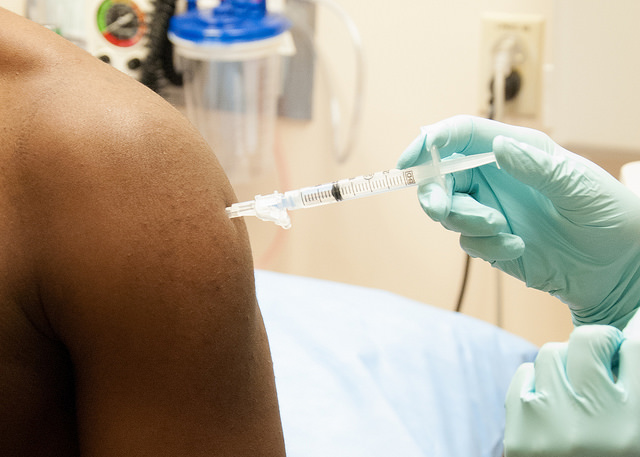What is a vaccine? How does it work?
A vaccine is an inactivated form of bacteria or virus that is injected into the body to mimic an actual infection. For example, measles vaccine is made from the measles virus. Because the vaccine is a weakened or ‘dead’ form of the germ (virus or bacteria) that cause the disease, they don’t cause a person to become sick. Instead, vaccines help your body make fighter cells called antibodies that act as a guard to fight the germs. So in the future, if they come across a germ they sound the alarm for your body to go on the defense and attack the germs right away. Vaccines protect them from the disease in the future. Vaccines are proven to be safe and effective.
How does getting vaccinated help your community?
Each year thousands of young people and adults get sick from vaccine-preventable diseases. Some of these people end up in the hospital with life-threatening conditions. By getting vaccinated, you can protect yourself and those around you.If you decide not to be vaccinated, it is possible you can spread these diseases to other children who are too young to be vaccinated or to people with weakened immune systems, such as people with cancer. To learn more about what vaccines you need, visit the Centers for Disease Control and Prevention’s webpage on vaccines for pre-teens and teens.
| Preteens and Teenagers Need: | |
| Tetanus, diphtheria, and acellular pertussis (Tdap) | A dose of Tdap vaccine protects you from tetanus, diphtheria, and pertussis (whooping cough). After getting a dose of Tdap, you will need a tetanus-diphtheria (Td) shot every ten years. |
| Meningococcal vaccine (MCV4/MenACWY) | MCV4 protects against meningococcal disease resulting from infection with serogroups A, C, W, or Y. It is recommended when adolescents are 11 or 12 years old, with a booster given at 16 years of age. |
| Meningitis B Vaccine (MenB) | The MenB vaccine protects against a fifth type of meningococcal bacterium (called type B). Teens starting college who live in shared residences are at most risk. It is a series of 3 shots given now, two months later, and six months later. |
| Human papillomavirus (HPV) | HPV is a group of viruses that commonly affects both boys and girls. All preteens and teens age 11 and older need two or three doses of the HPV vaccine depending on your age and health conditions.. The vaccine protects against cervical and other cancers and genital warts. |
| Influenza (Flu) | Everyone age 6 months and older needs a yearly influenza vaccination every fall or winter. |
| ** If not already received: 2 doses MMR, 2 doses of Varicella, & 3 doses of HepB |
Resources
Centers for Disease Control and Prevention, How Vaccines Prevent Disease
https://www.cdc.gov/vaccines/vac-gen/howvpd
Immunization Information for Teens
http://www.vaccineinformation.org/teens/
Preteen and Teen Vaccine Fact Sheets for Parents
https://www.cdc.gov/vaccines/parents/protecting-children


